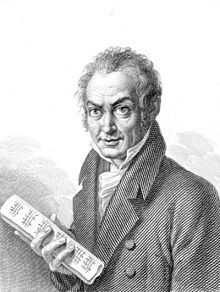Niccolò Antonio Zingarelli
Niccolò Antonio Zingarelli , also Nicola Antonio Zingarelli (born April 4, 1752 in Naples , † May 5, 1837 in Torre del Greco , Kingdom of the Two Sicilies ) was an Italian composer and a representative of the so-called Neapolitan School .
Life
Zingarelli received his training at the Conservatory of the Church of Madonna di Loreto in Naples under the direction of Fedele Fenarolis and later from Abbate Alessandro Speranza , a student of Francesco Durante .
In 1779 he made his debut at the Teatro San Carlo with the opera Montezuma , which was followed in the next few years by a large number of operas performed to increasing applause.
In 1792 he was appointed Kapellmeister of the Milan Cathedral , a position which he exchanged in 1804 for that of papal Kapellmeister in Rome . Here he came into conflict with the Napoleonic regime in 1811 because of his attachment to the Pope , which prompted him to return to Naples in 1812, where he was director of the royal music school in San Sebastiano and, after Giovanni Paisiello's death, also as conductor of the cathedral until his death unfolded extremely fruitful composing and teaching activities. In 1823 Zingarelli was accepted as a foreign member of the Académie des Beaux-Arts .
Work and meaning
Zingarelli is one of the last worthy offspring of the Neapolitan school founded by Alessandro Scarlatti at the beginning of the 18th century .
His operas, including Giulietta e Romeo in particular , aroused the delight of all of Europe until Rossini's appearance , and his church compositions, which he composed especially during the last years of his life, rank among those of his contemporaries in terms of solidity. His most distinguished students include the three most important Italian opera composers of the era between Rossini and Verdi : Vincenzo Bellini , Gaetano Donizetti and Saverio Mercadante .
Vocal works (selection)
- Montezuma (1781)
- Alsinda (1785)
- Antigono (1786, libretto: Pietro Metastasio )
- Ifigenia in Aulide (1787)
- La passione di Gesù Cristo (1787, libretto: Pietro Metastasio)
- Demofoonte (1789, libretto: Pietro Metastasio)
- Artaserse (1789, libretto: Pietro Metastasio)
- Antigone (1790)
- La morte di Cesare (1790)
- Pirro re di Epiro (1791)
- Annibale in Torino (1792)
- L'oracolo sannita (1792)
- Il mercato di Monfregoso (1792)
- Apelle (1793, revised as Apelle e Campaspe (1795))
- La secchia rapita (1793, re-performance of the Neuburg Chamber Opera , 2004)
- Quinto Fabio (1794)
- Il conte di Saldagna (1794)
- Gli Orazi ei Curiazi (1795)
- Giulietta e Romeo (1796)
- La morte di Mitridate (1797)
- Giuseppe in Egitto (1797)
- Ines de Castro (1798)
- Carolina e Mexicow (1798)
- Meleagro (1798)
- Il ritratto (1799)
- Il ratto delle Sabine (1799)
- Clitennestra (1800)
- Edipo a Colono (1802)
- Il bevitore fortunato (1803)
- Berenice regina d'Armenia (1811)
- Il sacrificio d'Abramo (oratorio, libretto: Pietro Metastasio, around 1815)
- La danza (cantata, libretto: Pietro Metastasio)
- Baldovino (1811, libretto: Jacopo Ferretti )
literature
- Siegfried Gmeinwieser : Zingarelli, Nicola Antonio. In: Biographisch-Bibliographisches Kirchenlexikon (BBKL). Volume 15, Bautz, Herzberg 1999, ISBN 3-88309-077-8 , Sp. 1596-1597.
Web links
- Works by Niccolò Antonio Zingarelli in the catalog of the German National Library
- Zingarèlli, Nicola Antonio , basic entry in the Dizionario Biografico degli Italiani on treccani.it (Italian), accessed on December 2, 2014
- Bibliography of the printed libretti of Zingarelli's operas as well as a short biography and music example at Italian Opera
- Opera works and manuscripts by Niccolò Antonio Zingarelli in the DFG opera project
- Sheet music and audio files by Niccolò Antonio Zingarelli in the International Music Score Library Project
- List of stage works by Niccolò Antonio Zingarelli based on the MGG at Operone
- Search for operas by Niccolò Antonio Zingarelli (search term in the Autore field : "Zingarelli Niccolò Antonio") in the Corago information system of the University of Bologna
| personal data | |
|---|---|
| SURNAME | Zingarelli, Niccolò Antonio |
| ALTERNATIVE NAMES | Zingarelli, Nicola Antonio |
| BRIEF DESCRIPTION | Italian composer and a representative of the so-called Neapolitan School |
| DATE OF BIRTH | April 4, 1752 |
| PLACE OF BIRTH | Naples |
| DATE OF DEATH | May 5, 1837 |
| Place of death | Torre del Greco , Kingdom of the Two Sicilies |
